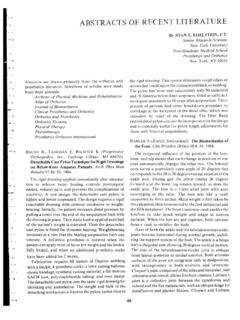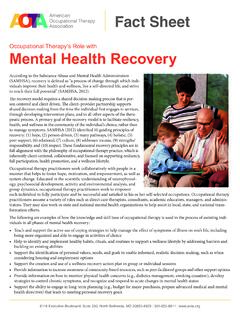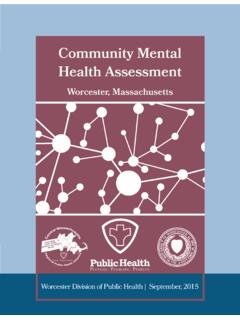Transcription of Psychosocial rehabilitation: Approach of choice for those ...
1 Psychosocial rehabilitation : Approach of choice for those with serious mental illnesses We begin by thanking the Editor of the Journal of rehabilitation Research and Development (JRRD) for commissioning a special issue on Psychosocial rehabilitation (PSR) for persons with serious mental illnesses. For many years, the conventional wisdom in the field of mental health Marianne Farkas, ScD. has been that serious mental illnesses result in inevitable deterioration. Pro- fessional practice has therefore focused on managing psychopathology and its symptoms. A wider variety of outcomes has been identified as critical over the past 30 years, however, particularly for individuals with schizo- phrenia [1 4]. These outcomes include regaining functioning over the long term, developing friendships, and living satisfying lives [5 9]. Thirty years of empirical evidence, as well as first-person accounts [10 13], support the notion that recovery from serious mental illnesses is possible.
2 As a result, governments in several countries have convened expert pan- els to review the evidence and recommend policy about the kinds of services that are best for those with serious mental illnesses. In the United States, the three most widely recognized of these are the 1999 report of the Surgeon General on mental health [14], the recommendations of the President's New Freedom Commission on mental health [15], and the Institute of Medicine's report on mental health and substance abuse [16]. The single most potent recommendation is to introduce a vision of recovery into the mental health system, a vision based on the accumulated evidence of what is possible. The result is that nothing less than recovery from serious mental ill- Mary A. Jansen, PhD nesses has become the guiding force behind policies and practices in many Federal and state mental health systems, as well as those of other coun- tries such as Canada and New Zealand [15,17 19].*. Psychosocial rehabilitation IN CONTEXT OF RECOVERY.
3 The vision of recovery should be the unifying mission of all mental health services [9,15,20]. Each service should clearly identify the recovery outcomes for which it holds itself responsible. In this context, PSR or psy- chiatric rehabilitation services contribute to recovery by focusing on out- comes related to role functioning in the real-world community [20]. rehabilitation of any kind ( , physical, psychiatric, social, etc.) is an ecological Approach ( person-environment fit ) that fits the framework of the consequences of disease and the goals of health proposed by the World * Department of Veterans Affairs. mental health strategic plan. Washington (DC): Department Walter E. Penk, PhD, ABPP of Veterans Affairs; 2004. vii viii JRRD, Volume 44, Number 6, 2007. health Organization (WHO) ( , classifying inter- rently built mostly on a hierarchy of evidence vention effects in terms of their contribution to including quasi-experimental studies, open clinical health , activity, and participation) [21].
4 PSR is con- trials, systematic observations, rigorous qualitative cerned with return of functional capacity and partici- studies, and some true RCTs [26,28]. pation in valued societal roles. The dictionary An important principle of today's mental health definition of rehabilitation is the restoration of systems is that the individual should be engaged in someone to a useful place in society (http:// the design, delivery, and evaluation of services. ). Rehabili- Research data suggest that outcomes are better for tation thus has two goals: facilitating success and sat- people who are meaningfully involved in the plan- isfaction in the performance of personally preferred ning and delivery of their services [29]. Consumer and valued roles and creating or promoting an involvement in designing and delivering mental increase in opportunities for participation in society. health services ( , program planning, implemen- These goals are accomplished by ensuring that the tation, and evaluation) is seen as a critical compo- person has the skills and supports necessary for suc- nent of a quality management system for any cess and satisfaction, a basic principle of PSR [20].
5 mental health service [30]. Given that recovery is Techniques designed to promote role competencies, predicated on an individual's full involvement and support for role success, and interventions to that the integration of services based on his or her increase empowerment and societal opportunities and specific contribution to the recovery mission is reduce discrimination are all within the pantheon of important for achieving the recovery goal, mental recognized rehabilitation techniques [22]. health systems are now focusing on the develop- The PSR field is relatively young and still at the ment of overall recovery plans. Department of Vet- earliest stage of researching the interventions that erans Affairs (VA) mental health services, for constitute it. While well-executed randomized clini- instance, have begun to use the recovery terminology cal trials (RCTs) are considered the gold standard and are one of the first systems to have designated for rigorous research, recent caveats have emerged the development of recovery teams and recovery about RCTs, especially in Psychosocial intervention plans as an institutional initiative.
6 Recovery plans [23 24]. These caveats particularly apply when the include goals and objectives that relate to individual goal is recovery, as opposed to more limited out- services ( , treatment goals, rehabilitation goals, comes, such as preventing relapse or rehospitaliza- crisis intervention goals, etc.). Within an overall tion, for example. While weighing in regularly on recovery plan, PSR plays in important role. A cor- the importance of evidence-based practices (EBPs) nerstone of the field is the recognition that those for those with serious mental illnesses, many promi- who have serious mental illnesses must be full part- nent researchers are calling for a broader variety of ners in the process and that, ultimately, they must be rigorous research designs that are more consonant the arbiters of whatever services are designed to with the multidimensionality of recovery and the assist them. state of our current understanding [25 27]. In fact, PSR interventions are not limited to those with the National Institute of Disability rehabilitation schizophrenia or other psychoses.
7 Increasingly, they Research (NIDRR) has funded several efforts to are recognized as effective for the symptoms of develop a research classification system that acute stress disorder and posttraumatic stress disor- includes these non-RCT designs.* Consequently, der (PTSD), especially when mental health practices the field of disability studies, including PSR, is cur- are integrated into the experiences of supported *Farkas M, Rogers ES. Innovative knowledge dissemination and uti- Department of Veterans Affairs. Recommendations of the lization for disability and professional stakeholders, National Insti- recovery transformation work group to the executive committee of tute of Disability rehabilitation Research, grant H133A050006. the mental health Steering Committee. Washington (DC): Continuation Report. Washington (DC); 2007. Department of Veterans Affairs; 2005. ix FARKAS et al. Guest editorial education and supported employment [31 32]. PSR As a result, PSR is recognized as the Approach interventions are likely to become even more of choice for helping those with serious mental ill- important in the range of services offered by VA cli- nesses achieve success and satisfaction in a particu- nicians and others who work with Operation Endur- lar societal role.
8 The following is a brief review of ing Freedom and Operation Iraqi Freedom combat PSR interventions and models. veterans returning from war zones in Afghanistan and Iraq and undertaking the arduous challenges of transitioning from identities as combatants to identi- EVIDENCE-BASED PRACTICE AND. ties as civilians. Psychosocial rehabilitation . INTERVENTIONS. As indicated, a commitment to the highest level of outcomes requires services that provide medication and other treatment interventions where needed, as Although no consensus exists about what con- well as Psychosocial interventions designed to help stitutes empirical evidence for an evidence base, individuals live productively in the community [33]. some authors state that a practice is evidence- Considerable research evidence has now accumu- based when two or more RCTs compare the practice lated on the effectiveness of several interventions favorably with an alternative, established interven- associated with PSR and the promise of others.
9 The tion or to no intervention [36 37]. recommendations of the highly respected Schizo- The evidence that supports provision of several phrenia Patient Outcomes Research Team (PORT) well-known and widely accepted clinical interven- [34 35] have become important in guiding mental tions has now accumulated to the point that these health treatment. The PORT recommendations sup- interventions are known as EBPs. Furthermore, for port adopting a comprehensive PSR model, based some of them, comprehensive tool kits have been on a range of clinical interventions from pharmaco- developed that summarize the evidence supporting logical to Psychosocial . The abstract of the most the practice, provide detailed implementation recent update of the PORT study summarizes its guidelines designed to ensure fidelity to the practice essence [35, p. 196]: as it was developed and researched, and recom- mend training so that providers are adequately pre- Since publication of the original Schizo- pared to provide the intervention.
10 Information on phrenia Patient Outcomes Research Team the EBP tool kits is available on the Web site of the (PORT) treatment recommendations in 1998, Substance Abuse and mental health Services considerable scientific advances have occurred Administration (SAMHSA) at in our knowledge about how to help persons under the heading mental health System Transfor- with schizophrenia. Today an even stronger mation, Evidence-Based Practices Implementation body of research supports the scientific Resource Kits [38]. basis of treatment. This evidence, taken in those interventions that are generally agreed to be its entirety, points to the value of treatment EBPs are assertive community treatment (ACT), approaches combining medications with psy- supported employment (SE), Integrated Dual Diag- chosocial treatments, including psychological nosis Treatment, Family Psychoeducation (FPsy), interventions, family interventions, supported Illness Management and Recovery, and Medication employment, assertive community treatment, Algorithm.
















